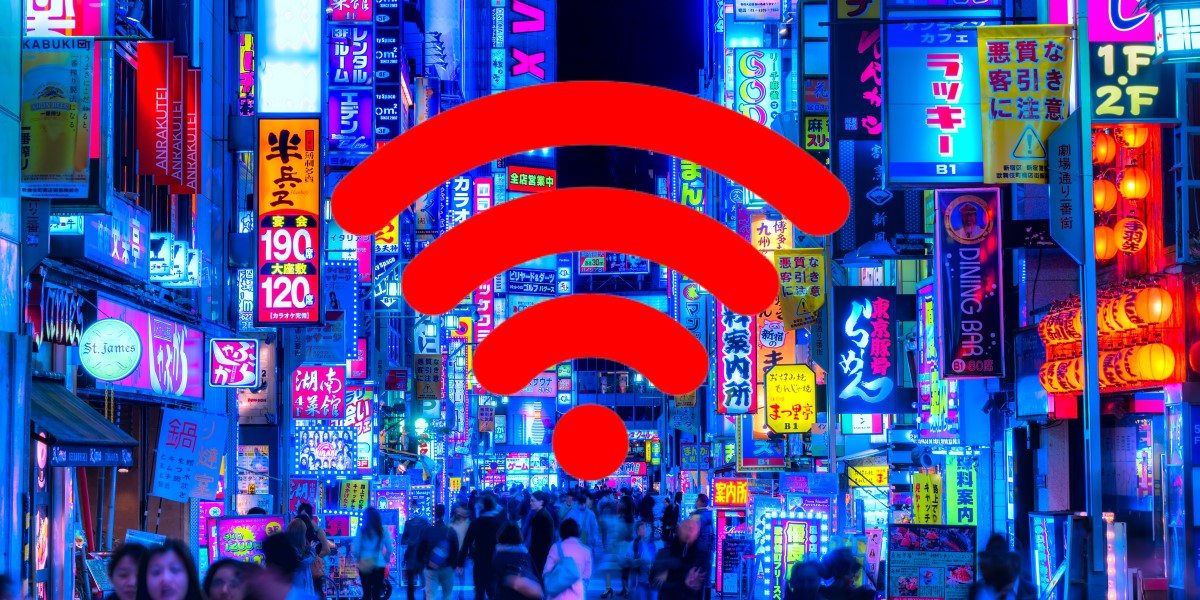Tokyo Has Millions Of Surplus Wi-Fi Access Points That Should Be Shared With Blockchain, Says NTT

Tokyo has five million Wi-Fi access points – and that's 20 times what the city needs, because they’re reserved for private use, according to NTT. The Japanese tech giant proposes sharing the fleet to cope with increased demand for wireless comms without adding more hardware.
NTT says it's successfully tested network sharing with a scheme that starts by asking operators of Wi-Fi access points or other connections if they're open to sharing their bandwidth and allowing random netizens to connect. In return they get a share of revenue from those connections.
Under the scheme, netizens search for available networks and, as they connect, a contract would be executed allowing a link to be made. That contract would use Ethereum Proof of Authority to verify identities and initiate the back-end billing arrangements before allowing signed-up users and devices to join private networks.
The operator of the Wi-Fi access point gets paid, the punter gets a connection, and everything's on a blockchain so the results can be read for eternity.
- Energy efficiency starts to rock telcos' 5G infrastructure choices
- Japan's NTT Docomo uses invisibility cloak tech to fix 5G reception
- Ericsson's earnings slip as telcos rein in 5G spending
- NTT Data adopting datacenter inspection robots to relieve humans of some chores
NTT has added more tech to ensure that these ad hoc connections share spectrum efficiently and don't swamp a single access point.
All participating network nodes "use blockchain-ledger information to smooth out the number of terminal connections in a decentralized and autonomous manner and improve communications quality," states NTT's announcement of its trials. Those tests were conducted on "a mixture of wireless access systems having different administrators."
If this all scales, NTT estimates Tokyo won't need to add any more Wi-Fi access points or private 5G cells, even as demand for connectivity increases. The company also suggests it can enable networks to scale without requiring commensurate increases in energy consumption, and that spectrum will also be freed for other uses.
Those are outcomes it's hard to oppose.
NTT hasn't explained how it isolates transient connections from traffic created by an access point's owner or operator – a matter potential participants will surely want explained before sharing connectivity. The scheme will also need to overcome all sorts of other security objections about the dangers of using public networks. Not even the mighty power of blockchain can erase all of those issues.
The scheme will be detailed in mid-May at Tsukuba Forum – NTT’s annual networking conference. The Register will tune in to see if we can learn more about this technology. ®
From Chip War To Cloud War: The Next Frontier In Global Tech Competition
The global chip war, characterized by intense competition among nations and corporations for supremacy in semiconductor ... Read more
The High Stakes Of Tech Regulation: Security Risks And Market Dynamics
The influence of tech giants in the global economy continues to grow, raising crucial questions about how to balance sec... Read more
The Tyranny Of Instagram Interiors: Why It's Time To Break Free From Algorithm-Driven Aesthetics
Instagram has become a dominant force in shaping interior design trends, offering a seemingly endless stream of inspirat... Read more
The Data Crunch In AI: Strategies For Sustainability
Exploring solutions to the imminent exhaustion of internet data for AI training.As the artificial intelligence (AI) indu... Read more
Google Abandons Four-Year Effort To Remove Cookies From Chrome Browser
After four years of dedicated effort, Google has decided to abandon its plan to remove third-party cookies from its Chro... Read more
LinkedIn Embraces AI And Gamification To Drive User Engagement And Revenue
In an effort to tackle slowing revenue growth and enhance user engagement, LinkedIn is turning to artificial intelligenc... Read more

